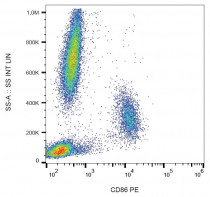ARG53908
anti-CD86 antibody [BU63] (PE)
anti-CD86 antibody [BU63] (PE) for Flow cytometry and Human
Developmental Biology antibody; Immune System antibody; Microbiology and Infectious Disease antibody
Overview
| Product Description | PE-conjugated Mouse Monoclonal antibody [BU63] recognizes CD86 |
|---|---|
| Tested Reactivity | Hu |
| Tested Application | FACS |
| Specificity | The clone BU63 reacts with CD86 (B7-2), a 70 kDa type I transmembrane glycoprotein of immunoglobulin supergene family, expressed on professional antigen-presenting cells, such as dendritic cells, macrophages or activated B lymphocytes. HLDA V; WS Code BP BP072 HLDA V; WS Code A A109 HLDA VI; WS Code BP 95 HLDA VI; WS Code B CD86.9 |
| Host | Mouse |
| Clonality | Monoclonal |
| Clone | BU63 |
| Isotype | IgG1 |
| Target Name | CD86 |
| Immunogen | B-lymphoblastoid cell line ARH 77 |
| Conjugation | PE |
| Alternate Names | B70; B7.2; LAB72; CD antigen CD86; B7-2; FUN-1; CD28LG2; T-lymphocyte activation antigen CD86; CTLA-4 counter-receptor B7.2; Activation B7-2 antigen; BU63 |
Application Instructions
| Application Suggestion |
|
||||
|---|---|---|---|---|---|
| Application Note | * The dilutions indicate recommended starting dilutions and the optimal dilutions or concentrations should be determined by the scientist. |
Properties
| Form | Liquid |
|---|---|
| Purification Note | The purified antibody is conjugated with R-Phycoerythrin (PE) under optimum conditions. The conjugate is purified by size-exclusion chromatography and adjusted for direct use. No reconstitution is necessary. |
| Buffer | PBS, 15 mM Sodium azide and 0.2% (w/v) high-grade protease free BSA |
| Preservative | 15 mM Sodium azide |
| Stabilizer | 0.2% (w/v) high-grade protease free BSA |
| Storage Instruction | Aliquot and store in the dark at 2-8°C. Keep protected from prolonged exposure to light. Avoid repeated freeze/thaw cycles. Suggest spin the vial prior to opening. The antibody solution should be gently mixed before use. |
| Note | For laboratory research only, not for drug, diagnostic or other use. |
Bioinformation
| Database Links |
Swiss-port # P42081 Human T-lymphocyte activation antigen CD86 |
|---|---|
| Gene Symbol | CD86 |
| Gene Full Name | CD86 molecule |
| Background | CD80 (B7-1) and CD86 (B7-2) are ligands of T cell critical costimulatory molecule CD28 and of an inhibitory receptor CTLA-4 (CD152). The both B7 molecules are expressed on professional antigen-presenting cells and are essential for T cell activation, the both molecules can also substitute for each other in this process. The question what are the differences in CD80 and CD86 competency has not been fully elucidated yet; there are still conflicts in results about their respective roles in initiation or sustaining of the T cell immune response. |
| Function | Receptor involved in the costimulatory signal essential for T-lymphocyte proliferation and interleukin-2 production, by binding CD28 or CTLA-4. May play a critical role in the early events of T-cell activation and costimulation of naive T-cells, such as deciding between immunity and anergy that is made by T-cells within 24 hours after activation. Isoform 2 interferes with the formation of CD86 clusters, and thus acts as a negative regulator of T-cell activation. [UniProt] |
| Research Area | Developmental Biology antibody; Immune System antibody; Microbiology and Infectious Disease antibody |
| Calculated MW | 38 kDa |
| PTM | Polyubiquitinated; which is promoted by MARCH8 and results in endocytosis and lysosomal degradation. |
Images (1) Click the Picture to Zoom In
Clone References








